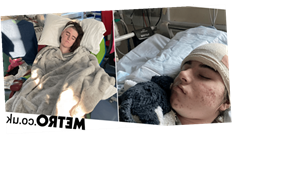When Imogen Golder was four years old, she began to have life-threatening seizures.
It took 12 years for her to finally get a diagnosis of rasmussen’s encephalitis, a rare inflammatory neurological disease that can cause dementia.
Sufferers of the illness experience frequent and severe seizures, loss of motor skills and speech, weakness on one side of the body, inflammation of the brain, and dementia.
At the age of 16, Imogen made the difficult decision to ‘switch off’ half her brain with a procedure called a hemispherectomy, in an attempt to stop her seizures and prevent her from developing dementia.
The operation disconnected the left hand side of Imogen’s brain and returned her to a child-like state, meaning she had to relearn how to walk and talk.
Now, she has said her first word after that operation: ‘mum’.
Imogen’s mum Karen, of Penzance, Cornwall, said: ‘The operation is quite rare in the UK.
‘Your brain is in two halves, two hemispheres, and each side is plugged into your neurology and your vascular system.
‘Imogen has damage on the left side of her brain, so they’ve disconnected all the connections from that side to everywhere else in her body – so functionally she has half a brain.
‘We’re still in hospital at the minute, it was only two weeks ago, the hope is that she will be seizure free but having said that she has already had two breakthrough seizures.’
The surgery sounds extreme, but Karen says it was the ‘only option’ to help her daughter.
‘Pre operation she had uncontrollable seizures,’ she explains. ‘We’d put her on a ketogenic diet which is used to control epilepsy but that didn’t work – nothing worked.
‘Surgery was the only option. She also had a weakness in the right side of her body, and had a cognitive delay.
‘This operation should stop the seizures, she’ll still have the weakness – she’ll have to learn to talk and walk again.
‘It takes away the field of vision on the right hand side of both eyes, so she had just 50 per cent of her sight.
‘But hopefully she’ll be seizure free, or at least have far less seizures, she’ll have more energy and be able to enjoy life. She was sleeping pretty much all the time.’
Imogen is currently recovering in Birmingham Children’s Hospital, after the operation on November 4, and has just uttered her first word, ‘mum’, for the second time.
Kaken said that Imogen is showing promising signs, but it could still be years before life returns to some degree of normalcy.
She continued: ‘We’re in Birmingham Hospital Childrens at the minute and she will be transferred to Bristol Children’s unit when she is able to – it’s led by her needs and abilities.
‘There are little bits of progress every day, she’s learning new words every day. This time last week she was like a baby and couldn’t hold her head up.
‘It’s like retrieving things, rather than relearning, the first thing she said was mum – then I think it was “dog”. Mum was the first thing she said as a baby too.
‘She’s also said little instinctual phrases that are stuck in her brain, so “wait a minute” came out.
‘We’re having speech and language therapy and we queue her up so say things like “when we’re tired we have to lie” and she thinks of the next word.
‘It’s like when you have a word on the tip of your tongue but you can’t retrieve it.’
Imogen’s diagnosis took such a long time because rasmussen’s encephalitis requires a series of criteria to be met and rigorous checks to be performed.
So while Imogen began having seizures and lost use of one of her arms when she was just four years old, she was only diagnosed with the illness 18 months ago.
‘For someone to be diagnosed with rasmussens, they have to have a weakness on one side, a cognitive delay, and the seizures have to be coming from just one hemisphere of the brain,’ Karen said.
‘You have MRI and EEGs, after an EEG they do what’s called a surgical EEG where lectroces are put through the skull into the brain so they can pinpoint where the seizures is coming from within the brain.
‘Then they took a biopsy of her brain and it was confirmed that she had R – that’s when the decision was made to act.
‘With rasmussen’s it pretty much always ends up with this procedure, if she was diagnosed sooner maybe her rehab may have been easier, but it wouldn’t have made much difference.
‘It will be at least two years before life goes back to normal, until she’s self sufficient again.’
Karen, who is also a part-time Baptist minister alongside her husband, Murray, 50, has shared Imogen’s story to help raise awareness for the condition.
The family is now accepting donations to help pay for Imogen’s rehabilitation. If you’d like to help, you can donate money through GoFundMe.
Do you have a story to share?
Get in touch by emailing [email protected].
MORE : Grandpa who cuddled intensive care babies for 14 years dies of cancer
MORE : Drinking coffee from disposable cups could be ‘seriously’ bad for you as you swallow microplastics
MORE : Mum tricks her six-year-old into thinking Aldi bodywash stops his tantrums
Source: Read Full Article


